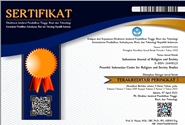The Dynamic Role of Moslem in Building Indonesia as a Nation-State
Abstract
This study figures out the historical journey of the Indonesian nation which is full of its own dynamics is marked by the prominent role of Moslem figures in fighting for and maintaining national unity. The socio-cultural diversity is vital capital as well as a big challenge for Indonesia in building a nation-state. For more than seventy years this pluralistic society has been united by one state ideology, namely "Pancasila" which is expressly stated in the constitution. Optimism was reflected in the economic progress achieved in the mid-1990s, but after the 1997-1998 economic crisis which was followed by a multidimensional crisis, social integration experienced major problems. This article explains the role of the Moslem community in establishing the Indonesian nation, seizing, and maintaining independence, as well as the potential threats to national integration. This article emphasizes again that the long journey of the Indonesian nation and the role of the Islamic community in its long history is an important capital that should not be forgotten in efforts to increase Indonesia's glory for the future. From independence until two-thirds of the century of it, the representation of Islamic groups is very calculated in managing government, however, in elections, they only have a significant enough vote but have never won. With a historical approach through a literature review, the author argues that there are many things that need to be done by the Indonesian people, especially the Moslem community to build Indonesia as a strong nation-state.
Keywords
Full Text:
PDFReferences
Adnan, R. (2013). Challenges and Hopes of Indonesia Reformation as State and Societies Transformation. Journal of Social Sciences and Interdisciplinary Research, 2(2), 85–106.
Arifianto, A. R. (2009). Explaining the cause of muslim-christian conflicts in indonesia: Tracing the origins of kristenisasi and islamisasi. Islam & Christian Muslim Relations, 20(1), 73-89. https://doi.org/10.1080/09596410802542144
Aspinall, E. (2015). The New Nationalism in Indonesia. Asia and the Pacific Policy Studies, 3(1), 72–82. https://doi.org/10.1002/app5.111
Aspinall, E., Fossati, D., Muhtadi, B., & Warburton, E. (2020). Elites, masses, and democratic decline in Indonesia. Democratization, 27(4), 505–526. https://doi.org/10.1080/13510347.2019.1680971
Bertrand, J. (2004). Nationalism and Ethnic Conflict in Indonesia. Cambridge University Press, United Kingdom.
Bloemraad, I., Korteweg, A., & Yurdakul, G. (2008). Citizenship and immigration: Multiculturalism, assimilation, and challenges to the nation-state. Annual Review of Sociology, 34(1), 153-179. https://doi.org/10.1146/annurev.soc.34.040507.134608
Brown, D., & Wilson, I. D. (2007). Ethnicized violence in Indonesia: Where criminals and fanatics meet. Nationalism and Ethnic Politics, 13(3), 367–403. https://doi.org/10.1080/13537110701451579
Castells, M. (2010). The Power of identity. Wiley-Blackwell.
Chaplin, C. (2018). Salafi Islamic piety as civic activism: Wahdah Islamiyah and differentiated citizenship in Indonesia. Citizenship Studies, 22(2), 208–223. https://doi.org/10.1080/13621025.2018.1445488
McCrone, D. (1998). The Sociology of Nationalism: Tomorrow's Ancestors. Routledge, USA.
Elson, R. E (2008). The Idea of Indonesia: A History. Cambridge University Press, United Kingdom.
Fogg, K. W. (2019). Indonesian islamic socialism and its south asian roots. Modern Asian Studies, 53(6), 1736–1761. https://doi.org/10.1017/S0026749X17000646
Formichi, C. (2021). Displacing Political Islam in Indonesia. Itinerario, 45(3), 413–434. https://doi.org/10.1017/S0165115321000267
Fukuyama, F. (1995). Trust - The Social Virtues and the Creation of Prosperity. Free Press, USA .
Furnivall, J. S. (1939). Netherlands India – a Study of Plural Economy. Cambridge University Press, United Kingdom.
Hadiz, V., & Robison, R. (2004). Reorganising power in indonesia: The politics of oligarchy in an age of markets. Routlage, United Kingdom.
Hasani, I & Naipospos, B.T. (2010). Wajah Para Pembela Islam. Pustaka Masyarakat Setara, Jakarta.
Hefner, R. (2000). Civil Islam – Moslems and Democratization in Indonesia. Princeton University Press. https://www.jstor.org/stable/j.ctt7szvv
Hefner, R. W. (2016). Indonesia, Islam, and the New U.S. Administration. Review of Faith and International Affairs, 14(2), 59–66. https://doi.org/10.1080/15570274.2016.1184444
Heryanto, A. (2018). Decolonising Indonesia, Past and Present. Asian Studies Review, 42(4), 607–625. https://doi.org/10.1080/10357823.2018.1516733
Kaneva, N., & Stanton, A. (2023). An alternative vision of statehood: Islamic state's ideological challenge to the nation-state. Studies in Conflict and Terrorism, 46(5), 640-658. https://doi.org/10.1080/1057610X.2020.1780030
Knapp-Retnowati, A. (2007). Soeharto – The Life and Legacy of Indonesia’s Second President. Marshall Cavendish, Singapore.
Lawler, S. (2008). Identity Sociological Perspectives. Polity Press, United Kingdom.
Lim, M. (2017). Freedom to hate: social media, algorithmic enclaves, and the rise of tribal nationalism in Indonesia. Critical Asian Studies, 49(3), 411–427. https://doi.org/10.1080/14672715.2017.1341188
Lindsay, S. (2000). Culture, Mental Models, and National Prosperity. In L. E. Harrison & S. P. Huntington (Eds.), Culture Matters How Values Shape Human Progress.
Machmudi, Y. (2008). Islamising indonesia: The rise of jemaah tarbiyah and the prosperous justice party (PKS). ANU Press, Australia.
Noer, D. (1982). Gerakan Moderen Islam di Indonesia 1900 – 1942. LP3ES, Jakarta.
Ricklefs, M. C. (2001). Sejarah Indonesia Modern 1200 – 2004. Serambi, Jakarta.
Rodrik, D. (2013). Roepke lecture in economic geography-who needs the nation-state? Economic Geography, 89(1), 1-19. https://doi.org/10.1111/j.1944-8287.2012.01177.x
Schwarz, A. (1999). A Nation in Waiting – Indonesia Search for Stability. Talisman Publishing, Singapore.
Shihab, N., & Nugroho, Y. (2008). The ties that bind: Law, islamisation and indonesia's prosperous justice party (PKS). The Australian Journal of Asian Law, 10(2), 233-267.
Smith, A. (2001). Nationalism – Theory, Ideology, History. Polity Press.
Solahuddin. (2011). NII sampai JI : Salafy jihadisme di Indonesia. Komunitas Bambu, Jakarta.
Sutanto, H. (1994). Perintah Presiden Soekarno – Rebut Kembali Madiun. Sinar Harapan, Jakarta.
Warburton, E. (2018). Inequality, Nationalism and Electoral Politics in Indonesia. In M. Cook & D. Singh (Ed.), Southeast Asian Affairs 2018 (pp. 135-152). Singapore: ISEAS Publishing. https://doi.org/10.1355/9789814786843-010
Widigdo, Mohammad Syifa A. (2018). Gerakan Islam Indonesia: Mengurai Belenggu, Membangun Peradaban, Journal of Islamic World and Politics, 2(2), 386-401. https://doi.org/10.18196/jiwp.2222
DOI: https://doi.org/10.36256/ijrs.v5i1.339
Refbacks
- There are currently no refbacks.
Copyright (c) 2023 Indonesian Journal of Religion and Society

This work is licensed under a Creative Commons Attribution-NonCommercial 4.0 International License.
Indonesian Journal of Religion and Society (IJRS) Is Indexed By:

Indonesian Journal of Religion and Society (IJRS) is distribute under Creative Commons Attribution-NonCommercial 4.0 International License.













